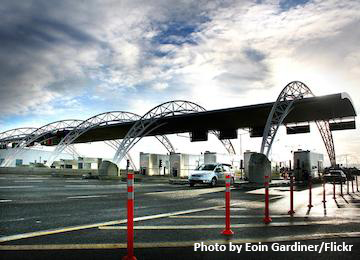
Germany’s test of taxing transit traffic
The question of how to tax transit traffic fairly under EU rules is likely to come to the fore after the German transport minister announced a new road toll aimed at non-German vehicles driving on German roads.
Interested in this kind of news?
Receive them directly in your inbox. Delivered once a week.
Berlin estimates that 170 million trips are made on German roads by cars registered outside Germany, so it wants their drivers to pay for some of the road infrastructure costs. The government has therefore proposed a road toll which should generate an additional €2.5 billion over four years.
German drivers would have to pay the toll, but other taxes currently paid by German motorists would be reduced to keep the measure fiscally neutral for German car owners. This has led some neighbouring states to say the toll is discriminatory – because non-German motorists will not get the benefits of the other reductions – and therefore illegal under EU law. But transport minister Alexander Dobrindt says the toll is not discriminatory because it will be levied in equal measure on German and non-German road users.
Germany shares a border with nine countries, more than any other EU state. One of them is Austria, whose transport minister described the proposed toll as a ‘discrimination against Austrian drivers’ and said Austria might take legal action against Germany – although Austria itself operates a motorway vignette system for car drivers too.
The toll proposals envisages charging €10 for a 10-day pass, and €20 for a two-month pass, applicable to all motorised vehicles under 3.5 tonnes (including motorcycles). Annual charges will be dependent on a car’s engine size and fuel type. Petrol cars would be charged less than diesel cars of the same size, and the maximum annual charge for any vehicle would be €108. The aim is to have the toll in place by the start of 2016, but it would need to be cleared by the Commission given that non-discrimination is a basic principle of EU law.
Germany’s environment agency UBA has criticised the plan, saying that its failure to take distance travelled into account means it has no meaningful environmental impact.
